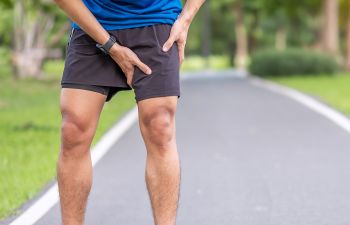
Discomfort in the lower abdominal region, the area where the thigh and pelvis meet, is known as “groin pain”. People’s perceptions of groin pain differ significantly. The pain can be dull, severe, throbbing or burning and it could come on gradually or rapidly.
The symptoms and root of groin pain help determine the best course of action in diagnosis and treatment. Furthermore, children’s groin pain is evaluated differently. But in this article, we will be reviewing adult groin pain.
Groin Pain Causes
The most common cause of groin pain in adults is muscle strain, but other conditions like hip osteoarthritis, hip fracture, hip labrum tear, hip osteonecrosis, a sports hernia and femoral acetabular impingement could be at fault. A few typical causes in detail include:
- Groin Strain: A groin strain is a pulled groin muscle. Athletic injuries cause this. However, any unusual hip movement could also tear or stretch the inner thigh muscles. Groin strains trigger immediate pain, the source of which is often obvious. They can also induce leg weakness and inner thigh muscle spasms.
- Kidney Stone: A kidney stone is a mineral cluster in the kidney that can induce mild to severe pain as it makes its way from the ribs to the lower abdomen through the urinary tract. The pain often radiates toward the groin.
- Inguinal Hernia: Inguinal hernias consist of fatty tissue or a segment of intestines pushing through a weak or damaged abdominal wall. Inguinal hernia patients often describe a tugging sensation and sometimes a dull pain when coughing or lifting objects. However, they can be symptomless. Some inguinal hernias are visible as a bulge in the groin.
When to Seek Medical Attention About Groin Pain
If your groin pain is a result of a strain or sprain, you can try self-care measures first. For example, you can take an OTC pain reliever and place an ice pack wrapped in a towel on the affected area for half an hour a few times a day. Also, refrain from physical activity until you recover, because rest is essential for healing groin pain.
If your groin pain is linked to abdominal, back or chest pain, there may be cause for alarm. In addition, if the pain is accompanied by fever, chills, nausea, vomiting and blood in the urine, seek professional medical help immediately.
If conservative therapy has not relieved your groin pain, visit Core Surgical in Midtown Manhattan. Our groin specialists can examine you and provide a treatment strategy.
Posted on behalf of
133 E 58th St Suite 703
New York, NY 10022
Phone: (212) 628-8771
Email: frontdesk@coresurgicalmd.com
Monday - Thursday: 9:00AM to 5:00PMFriday: 9:00AM to 4:00PM
Saturday - Sunday: Closed
